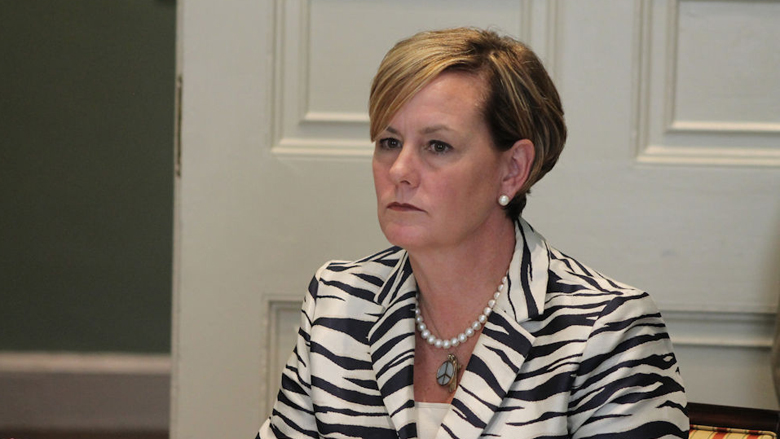Diversity of experience on parole board questioned as member seeks reappointment
By State House News Service | September 15, 2016, 6:38 EDT
 DUPRE [Photo: Antonio Caban/SHNS]
DUPRE [Photo: Antonio Caban/SHNS] STATE HOUSE — Prisoners’ rights advocates pushed back Wednesday against the current makeup of the state’s Parole Board, speaking against the reappointment of a member who has served on the board for five years but comes from a corrections background that’s already well-represented on the board.
Sheila Dupre, first appointed to the Parole Board in 2011 by Gov. Deval Patrick, appeared before the Governor’s Council for a hearing on her confirmation to another term.
Testifying in support of Dupre were fellow Parole Board member Tonomey Coleman and Mary Hurley, a retired District Court judge and former Springfield mayor who last week won the Democratic primary race for a seat on the Governor’s Council. With no Republicans vying to succeed outgoing Councilor Michael Albano of Longmeadow, Hurley is on track to become the council’s newest member in January.
“She has, I think, always done her utmost to do the best job possible,” Hurley said of Dupre. “I would also indicate to you, I don’t know if you know or not, but she is a tremendously courageous woman. She’s a cancer survivor. She dealt with that aspect of her life with courage, determination, and not one moment of pity for herself.”
Albano, who presided over the hearing, said Parole Board Chairman Paul Treseler, Hampden County Sheriff Michael Ashe, Middlesex Sheriff Peter Koutoujian, Department of Correction Commissioner Thomas Turco, Hampden County House of Corrections Assistant Superintendent Kevin Crowley and others submitted letters recommending Dupre.
Crowley wrote in his letter that Dupre’s experience and knowledge “has allowed her to be creative in making parole decisions,” calling her a “great partner” for his department.
Dupre started her career working for Ashe in Hampden County, working there for 16 years. She then moved to the Department of Correction, where she conducted audits of state and county facilities. She has also worked as a consultant for the American Correctional Association and the National Institute of Corrections.
Criminal Justice Policy Coalition Executive Director Rachel Corey, one of two witnesses who testified in opposition, described Dupre’s background as “corrections-heavy.”
Corey said she was “not personally against” Dupre, but believed the board could “have a greater diversity of skill sets.”
By statute, members of of the Parole Board must have at least five years of training in the fields of parole, probation, corrections, law, law enforcement, psychology, psychiatry, sociology or social work.
According to Corey, the board’s current makeup includes two people from law enforcement, one from corrections, one with parole experience, one with legal experience, a psychologist and no one from the fields of psychiatry, sociology or social work.
Attorney Patricia Garin voiced similar concerns about the board’s structure. Garin, the co-director of the Prisoners’ Rights Clinic at the Northeastern University Law School, testified against Dupre in 2011 as well, saying at the time she wanted to see Parole Board members who had experience working with prisoners.
On Wednesday, Garin said someone with clinical experience in mental illness would be a “welcome addition” to the board.
“Nothing is happening for all of these mentally ill people, except they’re getting parole denials, time after time after time,” Garin said. “It’s a huge problem in parole these days and it’s what we need help with. It’s what the DOC needs help with, it’s what the sheriffs need help with, and frankly the Parole Board needs help with.”
Councilor Jennie Caissie, an Oxford Republican, said she was “really befuddled” by the criticism, comparing an aversion to people from the Department of Correction serving on the Parole Board to “saying you don’t need doctors in the ER.”
“If you talk about experience in these different areas, I would say she’s a hat trick at least under the requirements of the statute,” Caissie said. “Whether it’s parole, probation, corrections, law enforcement, psychology, sociology, social work, I mean, she kind of covers the whole statute, never mind honing in on one particular area.”
— Written by Katie Lannan
Copyright State House News Service









